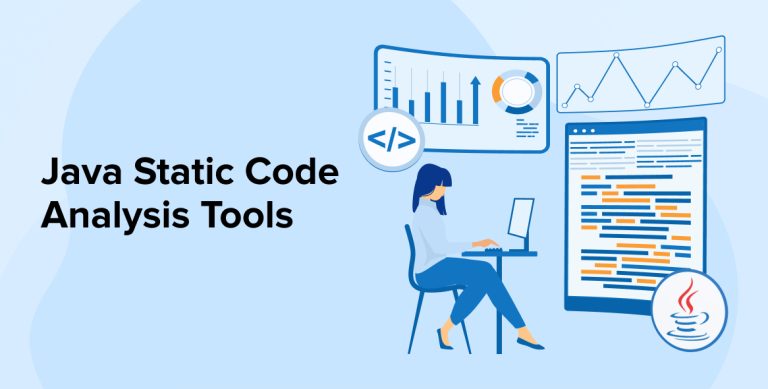
The “write once, run anywhere” approach of Java makes it one of the most popular programming languages. On top of that, it comes with a rich library and strong community support. Furthermore, using static code analysis tools enables developers to make effective use of a programming language. Expert developers from Java development companies leverage static code analysis to evaluate their source code to find and fix errors early in the development cycle.
You can use code analysis tools to ensure that your code is up to the accepted standards, understand the runtime behavior, and enhance the app architecture. New developers are not skilled enough to implement best coding practices or analyze their code to ensure quality. Even expert developers are required to use code analysis tools for accurate results.
This article discusses the concept of static code analysis in Java, its advantages and disadvantages. More importantly, it features a curated list of top Java static code analysis tools.
1. What is Static Code Analysis?
The process of evaluating the source code without running it to detect potential issues or security vulnerabilities is called static code analysis. This approach ensures the quality and reliability of the software by identifying problems early on in the development stage. This helps save a lot of your time and money. You also get a detailed report with valuable insights after every code analysis. The static code analysis also allows developers to enforce accepted coding standards and guidelines, such as MISRA, and ISO26262.
1.1 Benefits of Static Code Analysis
There are many advantages of using static code analysis tools, including:
- Enhanced security: Static code analysis is very effective at identifying XSS vulnerabilities, buffer overflows, SQL injection attacks, unencrypted data, and weak passwords. By addressing these issues developers can prevent security breaches and create the development of a secure app that can protect its data.
- Increased efficiency: Automated code reviews and early error detection increase code efficiency and boost developer productivity. This leads to reduced time to market and the deployment of quality software.
- Ensuring code quality: Static code analysis tools help maintain coding standards and best practices to promote code quality and consistency. Moreover, the error detection capabilities of these tools ensure that you deploy an app with clean and high-quality code.
- Early problem identification: With static code analysis tools, help find errors and vulnerabilities in your code in the early stages of the development process. It enables you to address these issues before they inflict serious damage on your application or project.
1.2 Limitations of Static Code Analysis
There are some limitations to static code analysis, such as:
- Possibility of false negatives/positives: In some instances, static code analysis tools can sometimes produce false positives. This not only nullifies the time and effort spent in the code analysis but also demands more work to generate a valid report. The reasons behind the occurrence of false positives are said to be when the code is non-compliant or is flagged as problematic. A tool generates false negatives in case it fails to identify any actual issue in the code.
- Time-consuming: It takes a while to conduct static code analysis, especially when evaluating the whole codebase altogether. Although the tools guarantee detailed reports, they contain a substantial amount of information and insights. Even with automation in the review process, it would require a person to interpret the results, identify the real issues from false positives, and implement the changes.
- Scope limitations: The static code analysis can only detect the problems related to the code execution. These tools can’t find problems with the performance or the utility of the code. These code analysis tools can’t detect runtime errors either.
1.3 Best Static Analysis Tools to Improve Your Java Code
After discussing the advantages and disadvantages, it’s time to take a look at some of the Java static analysis tools that can help you with the assessment. This list contains the options that are most popular for static analysis and are preferred by Java developers.
1.4 Checkstyle
Checkstyle is a popular static analysis tool used to verify that Java source code meets the expected quality standards. It offers automation features to detect method design, class, formatting, and layout issues.
Checkstyle comes with a configuration that supports all coding standards. It doesn’t even need any external library to run standard checks on the general Java coding style. It accumulates information using a special filter when performing holder checks on the code.
With the help of an integration plugin, you can install this static analysis tool in an IDE like IntelliJIDEA, Eclipse, and Maven. Checkstyle provides an overview of all the problems it identified in the code and highlights the ones that need to be addressed immediately. Checkstyle is certainly very useful in keeping your code operational with minimum risks.
1.5 FindBugs/SpotBugs
FindBugs is an open-source tool for static analysis. It scans your Java application code to find potential defects or common bug patterns. It reports to the users about its findings in the form of warnings, pointing out that potential defects may lead to performance issues. Findbugs can report warnings in different categories such as security issues, malicious code vulnerability, performance concerns, bad practice, correctness, and more.
Spotbugs, the successor of Findbugs, is also a source code analyzer that works similarly to Findbugs. However, Spotbugs takes things a step ahead. Instead of just highlighting the problems, Spotbugs also ranks them based on their severity. This tool helps developers identify the critical problems and address them first. It can easily integrate this open-source tool with popular Java build tools. It also offers options for automated scans and report generation.
1.6 PMD
PMD is a popular static code analysis tool, that supports multiple programming languages including Java, Python, Swift, Ruby, C, C++, C#, JavaScript, PHP, Go, and so on. Analyzing Java code with PMD allows you to discover errors like code complexity, performance variables, unused code, duplicate code, and naming conventions.
PMD also offers seamless integration with the best Java IDEs and build tools like Ant, TextPad, NetBeans, Emacs, Maven, IntelliJIDEA, and Eclipse.
1.7 JUnit
JUnit is a widely used framework for unit testing. It helps you write test cases and execute them to increase the reliability of the code and minimize any chance of mistakes. JUnit provides various annotations and APIs to define and test cases effectively. Thanks to its simple structure, JUnit is easy to use even when working with complex code. With a wide unit test coverage, JUnit can help you save a lot of time and money in the long term.
1.8 Infer
Infer is a static analyzer designed to find bugs in mobile and desktop apps before they are launched. After a thorough analysis, it generates a report list of bugs present in the C, Java, and Objective-C code. Infer can also detect null pointer exceptions and memory leaks in the code.
The static analysis techniques from Infer enable the developers to trace the glitches in the system to its source. Meta is using this code analyzer in all of its applications for Android and iOS platforms. If you have any specific project requirements then Infer would need to be reconfigured. It has an extensive codebase scalability.
1.9 jQAssistant
Built upon the Neo4j engine, jQAssistant can automatically detect bugs in your standard code. jQAssitant can detect visual constraints automatically. It can also find problems in your tests and can separate the execution process from APIs. The automation capabilities of this static coding analysis tool can save a lot of your time in the coding process. As a result, you would have an efficient and high-performing application.
1.10 Spoon
Spoon is an open-source library used for altering the Java source code. It supports all modern versions of Java. Spoon conducts a robust analysis and API transformation through its well-designed Abstract Syntax Tree. It can also leverage various integration development environments to build a strong program model and parse source files effectively.
The text version of the Spoon model is formed by semantically replicating the original code. Spoon has transformation operators that quickly find invalid programs in your system with its user-friendly analysis and transformation API.
Spoon would need Java development kit 11 or higher to operate, despite being able to consume the source code of older Java versions. This tool was designed to warn developers about invalid programs.
1.11 JaCoCo
JaCoCo is an open-source tool for static analysis. Java developers can use it to measure and report code coverage. The code coverage determines how much of your source code is covered in a testing plan. Many top IDEs and platforms such as Visual Studio, IntelliJ, Jenkins, SonarQube, Gradle, NetBeans, and Eclipse provide plugins for integration with JaCoCo.
1.12 SonarQube
SonarQube ensures the security and quality of your code, especially if it’s a large and complex project. Developers can continuously deploy clean and reliable code through deep integration into enterprise environments. Although it is self-managed, SonarQube is also flexible enough to offer customization capabilities.
Using SonarQube, you can deliver secure and high-quality code in over 30 programming languages, IaC platforms, and frameworks. It also offers seamless integration with various DevOps platforms including Azure, GitHub, Bitbucket, and GitLab.
SonarQube employs a clear go/no-go Quality Gate to prevent any issues while writing code. This analysis tool enables you to integrate with IDEs using SonarLint extensions for quick error detection. Additionally, it offers unified and shared configurations to ensure the overall health of the code.
1.13 Error Prone
Error Prone is a Java code analysis tool for detecting common issues during compilation. Once you hook it up with the standard build process, it can immediately find problems and suggest potential solutions. It also allows you to build an automatic bug checker, which can save your time, and improve productivity.
2. Conclusion
Java development can be a difficult undertaking but using code analysis tools make things easy for you. These tools assist with the development and testing process. It evaluates your code for errors and offers possible solutions. This ought to save your time and increase developer productivity and code efficiency. There are many options available in the market but it’s important to choose the right Java static code analysis tool that helps fulfill your project requirements.
FAQs
What is Static Code Analysis in Java?
Static code analysis in Java is a technique to review Java source code. The SCA tools allow developers to detect security and performance issues in the code before it is launched.
Why is Static Code Analysis Important?
Static code analysis helps developers save time on writing and testing their Java code. It also helps prevent errors and deliver high-quality code.
What are the Best Static Code Analysis Tools for Java?
Some of the best Java static code analysis tools are Checkstyle, FindBugs/SpotBugs, PMD, JUnit, Infer, jQAssistant, Spoon, JaCoCo, SonarQube, and ErrorProne.






Comments
Leave a message...